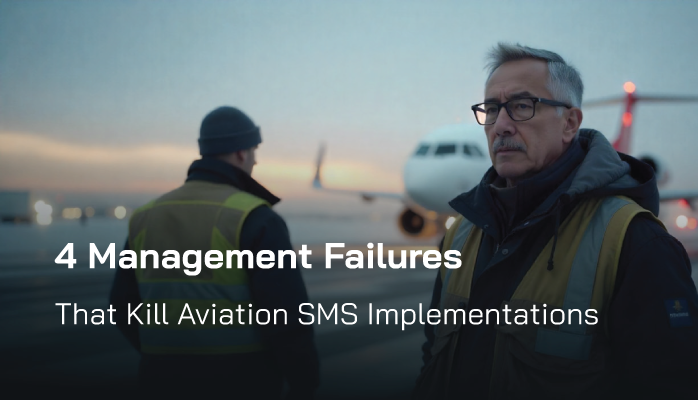More Insidious Than Confrontational

Formal aviation safety management systems (SMS) have been continually being implemented across the world for over a dozen years now. Some are successful, while many are not. Failed or under-performing aviation SMS is a concern for account executives and the safety team.
How can management increase the chance of a successful SMS implementation?
How do safety managers remain alert to risks to their SMS implementation?
How can safety managers and accountable executives avert SMS failure before too many years and wasted resources accumulate?
Related Aviation SMS Implementation Articles
- Why Should We Implement Aviation SMS?
- Overview of 4 Phases of Aviation SMS Implementation With Free Resources
- SMS First Steps - How to Create an SMS Implementation Plan
We are well aware and often reminded of the more ostensible aviation SMS killers, including
- Resistance to change;
- Resistance in upper management levels;
- Toxic safety cultures;
- Weak commitment by accountable executive;
- Lack of financial and qualified human resources; and so on.
These are the most obvious roadblocks in aviation SMS that safety managers deal with every day.
But other, more subtle, and preventable SMS failures often get lost in the shadow of more confrontational problems.
Such insidious problems may be behaviors that you have observed without identifying them for what they were. Or, diagnosing them may require a hard look in the “managerial mirror,” as you or your coworkers in your aviation SMS may unwittingly be part of the problem.
The idea of pointing out the less obvious troubles that aviation SMS faces is to draw attention to the fact that many problems:
- Exist because of historical managerial behavior
- Are born from a place of insecurity
- May come from a place of good motivation, but with the opposite consequence
In so many words, the following failures are unlike more common problems because they don’t resemble the underlying culprits of rebelliousness or apathy that are so often identified as main roadblocks in aviation SMS. Yet, they still can be a major part of why employees don't care about the organization's SMS implementation.
1 – Hindsight Bias and Past Successes for Aviation SMS

Hindsight bias is a real killer of proactive SMS. But not necessarily in the way that you think. We generally think of hindsight bias in the negative sense of looking back upon a situation and determining what choices should have been made. It looks like this:
- Something unexpected happened
- Certain choices were made
- And the situation deteriorated
- Therefore choice X, Y, and Z should have been made for different consequences
But we also experience hindsight bias when we go through the same process in situations that did not deteriorate when we quickly decide that the RIGHT choices were made. This way of thinking is the fast track to past successes as future guarantees. There are no future guarantees when it comes to SMS implementations – every situation is unique.
The problem with hindsight bias in aviation SMS is that it derives from the wrong approach to analyzing situations: looking at choices with the judgment of good & bad. Rational choices can and will lead to seemingly random (and bad) consequences. Irrational choices may turn out just fine.
Assessing a situation should hinge more on thoroughly analyzing how the complex interactions of unique factors changed in “real-time” with each choice. Simply put, understand the relationship between choices and unique factors, not whether choices were simply "good" or "bad."
Related Aviation SMS Implementation Articles
- How to Evaluate Risk Controls and Risk to Aviation SMS Implementations
- Aviation SMS Implementation Struggles and Solutions
- FAA Part 5 - Understanding Scope of Aviation SMS Implementation
2 – Corporate Culture in SMS
The relationship between front-line employees and management can make or break a safety culture. As we well know, the quality of SMS performance largely depends on an organization’s safety culture. When management builds a culture of corporatism, it is very difficult for a high-performing safety culture to exist.
In general, corporate culture is seen as:
- Nepotism: putting personal favoritism above qualification
- Cronyism: appointing individuals based on ideologies such as religion, politics, etc.
Both nepotism and cronyism are about management making most decisions on a personal rather than professional level. While there can be certain upsides to such practices, they are generally unfavorable for performant aviation SMS because they widen the gap between management and front-line employees.
But above and beyond the common understanding of corporate culture, it exists more commonly in subtle ways. Things like:
- Having little personal interaction outside of management
- Making risk management decisions from the sole point of view of management's concerns
- Putting the needs of management above employees
Unfortunately, such practices are all too common in aviation SMS programs because of the historical precedent of SMS as being driven from the top down. Subsequently, the idea that management’s needs should come first affects management in the SMS planning phases and continues during the SMS implementation. Aviation SMS becomes more complex every day, and larger programs will not be able to create healthy safety cultures with such practices.
Related Aviation SMS Implementation Articles
- 3 Myths About Aviation SMS Implementation
- How to Create Aviation SMS Implementation Plan - With Templates
- Your Top 4 Risks to Aviation Safety Management System Implementations
3 – Preoccupied With Safety Compliance
Safety compliance is a good thing. It demonstrates a measure of the effectiveness of SMS implementation. It makes auditors happy. It shows faith in the governing aviation regulatory agencies. It makes management look good. All good things.
There is also the darker side of compliance when an organization's focus on compliance supersedes the unique needs of the organization. Instead of finding creative ways to adapt SMS compliance to their organizational culture, such organizations do everything in their power to bend the needs of their organization's SMS to be compliant, even when the implemented processes don't fit well with the organization's safety culture. They are called prescriptive safety programs.
Of course, there is a time and place for prescriptive programs, such as with new or immature SMS implementations. Becoming compliant should be the goal immature SMS implementations aspire to. Beyond that, it is the fidelity of each organization to develop its own custom performance measurements of its SMS implementation. Too often prescriptive organizations persist because of managerial timidity and/or lack of further motivation. Should an accident occur, prescriptive SMS management teams can shake free of responsibility by claiming "in compliance."
Doing more for Safety Assurance than simply being compliant requires:
- Thoughtful analysis of SMS performance
- More time, effort, and creativity to meet the SMS needs than merely being compliant
- Safety managers that understand aviation risk management principles
- Accountable executives that support safety teams "thinking outside the box"
- Greater efficiency in the use of resources
And above all, it takes the courage of management to own their SMS and take responsibility.
4 – Information and Personal Dependencies in SMS Structure

Dependencies in aviation SMS implementations are unfortunately all too common. They generally take the form of dependencies on a person and bottle-necking of safety information. These tell-tale symptoms often go hand in hand. Usually existing because of an individual's insecurity about their position or place in the company, both bottle-necking and dependencies are extremely detrimental to cultivating transparency in aviation safety cultures.
What they both have in common is that the ability to respond, mitigate, or absorb unexpected events is put into the hands of one person, rather than the safety network of front-line workers. Common scenarios look like this:
- A manager is uncomfortable with a new system or aviation SMS software, and so resists by taking a back door, "handle it myself," under-the-table approach to safety
- A manager insists on personally overseeing and/or delegating every issue, which also means that the flow of information rests solely with them
In both scenarios, managers take an unhealthy measure of control that shifts the SMS' performance from the abilities of several/many individuals to that one manager. In politics, we call this despotism. Lack of transparency in SMS data management processes affects safety culture. Subsequently, employees in these toxic safety cultures have little incentive to participate in the SMS.
Related Aviation Safety Culture Articles
- What Is Safety Culture in the Aviation Industry?
- 5 Characteristics of Effective Aviation Safety Cultures - With Free Survey
- How to Change Toxic Safety Cultures in Aviation SMS
Final Thought: Be Critical of Yourself
No SMS implementation is perfect. And there is no expectation that the SMS must be perfect. First, we only care about satisfying the organization's goal related to the SMS implementation. In most cases, the operator is concerned with being compliant. Proactive, forward-thinking companies have the goal of turning their SMS into a profit driver and improving their business processes.
Some of the above points will exist in some form or another. As the primary goal of SMS should not be to "deflect" 100% of issues but to adapt and absorb them, it is also the responsibility of management to be honest with itself so that it can mitigate such practices.
As said before, often management's failures in aviation SMS implementations don't come from a place of conscious activity. Rather, they are behaviors that build up over time: a kind of "drift into behavior." As long as management is conscious of the tendencies of their organizational culture, they can quickly address them before they turn into outright problems.
Many times you will find your risk management workflows to be cumbersome. A quick review is often beneficial.
Last updated in October 2025.








